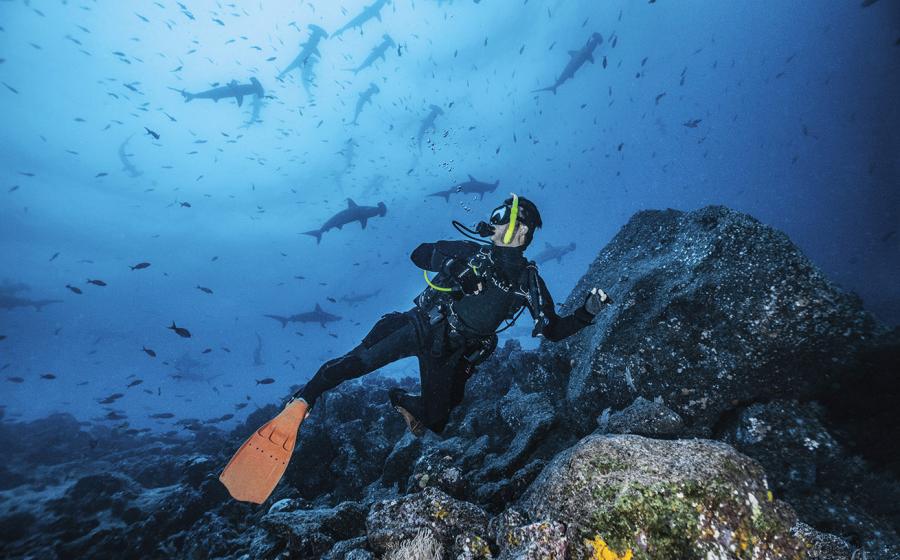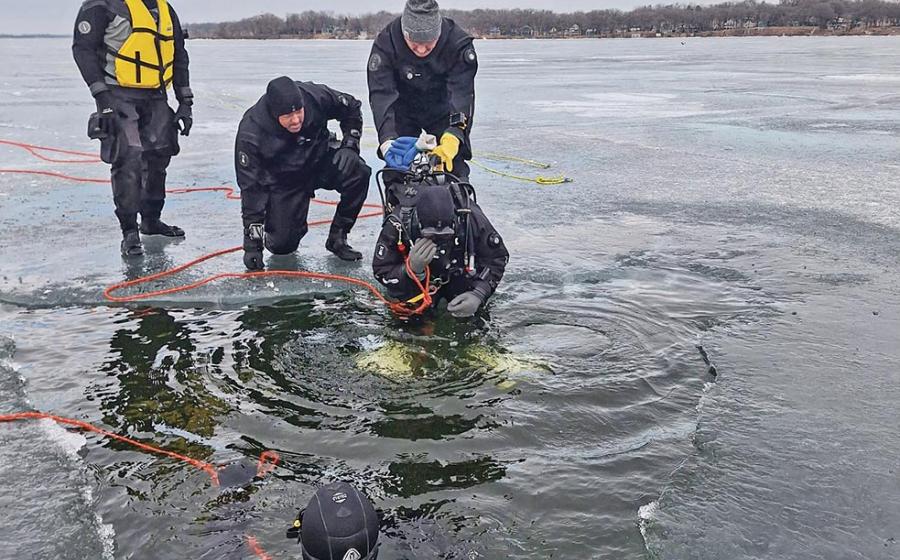Underwater Patriots: Scuba Soothes Wounded War Veterans

Woody WelchA wounded veteran prepares for a dive in San Antonio's Spring Lake.

Woody WelchWeightlessness underwater is a big draw for disabled soldiers.
By Melissa Gaskill
Diver I left the South Padre Island dock in predawn darkness, motoring out into the Gulf of Mexico under a bright moon. By the time it reached Little Adam — an offshore platform 50 miles away — the sun shone in a clear, blue sky. The crew bustled about, helping divers gear up for a forward roll into the water. Beneath the platform, curious barracuda, large schools of jacks and snapper, and even a few sharks awaited. Divers swam among the corals, fans and sponges that cover the jungle-gym structure, which shelters a variety of reef fish from just below the surface to more than 100 feet deep.
Back on the boat, tangled among the usual assortment of gear bags, towels and iPods, there were several prosthetic limbs, belonging to wounded soldiers who learned adaptive diving as part of their rehabilitation. Underwater, missing limbs hardly matter. Weightlessness makes chronic pain disappear. A dive can even help lessen the symptoms of post-traumatic stress disorder.
Most of the thousands of military service members injured in Iraq and Afghanistan receive initial medical treatment in Germany, and then end up at either Walter Reed National Military Medical Center in Bethesda, Maryland, or Brooke Army Medical Center in San Antonio for continuing treatment and rehabilitation. At both facilities, adaptive sports play a key part in that rehab, and reintegration into active duty or civilian life. And according to Mark Heniser — a physical therapist at Center for the Intrepid, BAMC’s outpatient rehabilitation facility — one of the most helpful adaptive sports is scuba diving. It strengthens core muscles, increases endurance and improves balance. Just as important are mental benefits, such as regained self-confidence.
“At least 75 percent of our guys have never been diving before,” Heniser says. “It opens new horizons, introducing things they hadn’t done before they got hurt. That’s true of other adaptive sports, but diving also gives them a sense of freedom, weightlessness and no boundaries. And it’s something they can do the rest of their lives.”
One of the divers at that South Padre platform, Army Staff Sgt. Robert Samuel, was on a mission in Afghanistan in 2009 when an IED blew up the left side of his armored vehicle. He woke up in a military hospital in Germany with a broken arm and missing his left leg below the knee. Samuel went to Walter Reed hospital and then Brooke Army Medical Center for rehabilitation.
“Diving was on my bucket list of things to do, but I never thought it would take me losing my leg to do it,” says Samuel, who grew up in Florida. Heniser suggested the dive program to him. First, though, Samuel had to learn to swim. On his first open-water dive trip, he says it took him a while to get into the water. One time was all it took, though. “Once I did, all I wanted to do was go back. It was mind-blowing. Now every time they have a dive trip, I’m begging to go.”
Tim O’Leary, owner of American Diving in South Padre and a military veteran himself, has invited soldiers who are in rehab along on Diver I trips for several years. He’s one of many individuals and organizations making a diving experience possible for these soldiers.
Another is Soldiers Undertaking Disabled Scuba, founded in 2007 at Walter Reed by dive instructor John Thompson. SUDS offers dive classes to Operation Iraqi Freedom and Operation Enduring Freedom service members who are in physical or occupational therapy, as well as to some discharged service members. The organization also raises funds to cover open-water checkout dives in Guantanamo, Cuba, Morehead City, North Carolina, and other locations. Thompson now lives in San Antonio and helps with the dive program at Center for the Intrepid.
“Water is the great equalizer,” Thompson says, “and diving is a catalyst for these guys, a confidence booster. It’s tough for someone physically active who comes home missing a limb or two. Then they discover they can dive as well as anyone else.” That accomplishment often motivates someone to try other activities that they might not have attempted before.
Able-bodied divers can support adaptive diving like the South Padre trip, says Heniser, just by welcoming the participants on dive boats. “Be supportive, offer to help if needed, but don’t be overbearing. Most of these guys, especially those who’ve been through SUDS or the Intrepid program, are self-reliant.” Divers or operators who have the financial ability or physical opportunity can help by making diving available to soldiers in these programs.
Out in the Gulf that day, the former soldiers geared up along with everyone else, and came back on board full of the same stories of sighting sharks, barracuda and more. They snarfed down breakfast tacos and snoozed on the boat ride home. It was just another great day of diving and, at the same time, so much more. “When I’m in the water, I don’t even think I’m missing a leg anymore,” says Samuel. “I feel like a fish — no worries. I’ll be diving until my heart stops, and trying to get everybody else to go. It makes me feel normal.”
Adaptive Diving in Action
A number of organizations and programs help military service members. Those who work with injured soldiers say some organizations do more than others, and ask people who want to support such efforts to choose with care.
>Disabled Sports USA -— originally founded by disabled Vietnam veterans to serve those injured in war — today provides sports, recreation and education programs to all individuals with disabilities. The organization has funded dive training and trips at Center for the Intrepid. dsusa.org
_ _
>Soldiers Undertaking Disabled Scuba offers dive classes to Operation Iraqi Freedom and Operation Enduring Freedom service members in physical or occupational therapy. SUDS also raises funds to cover open-water training dives. sudsdiving.org
>The Air Warrior Courage Foundation assists disabled former members of the military and their dependents. Since 2006, the Foundation and Duggan’s Diving have covered the cost of equipment and scuba training for more than 125 injured soldiers at Brooke Army Medical Center. airwarriorcourage.org
>The Wounded Warrior Project serves military service members who have post-Sept. 11 injuries or illnesses, and the service members’ families. It provides transitional care packs to those injured overseas, and special backpacks at military trauma units in the U.S., as well as adaptive sports events. woundedwarriorproject.org
Supporing Diving Soldiers
Adaptive scuba is offered at Walter Reed National Military Medical Center and Brooke Army Medical Center’s Center for the Intrepid. To help, donate to Soldiers Undergoing Disabled Scuba (sudsdiving.org) or the Air Warrior Courage Foundation (airwarriorcourage.org).
By the Numbers
49,251 -- service members wounded in Iraq and Afghanistan as of August 2012
20,891 -- Wounded Warrior Project alumni
91 -- percent of participants in WWP sports event who sought out other sport or recreation opportunities
300 -- number of wounded soldiers who took SUDS dive training
50 -- average number of divers certified each year at the Center for the Intrepid






